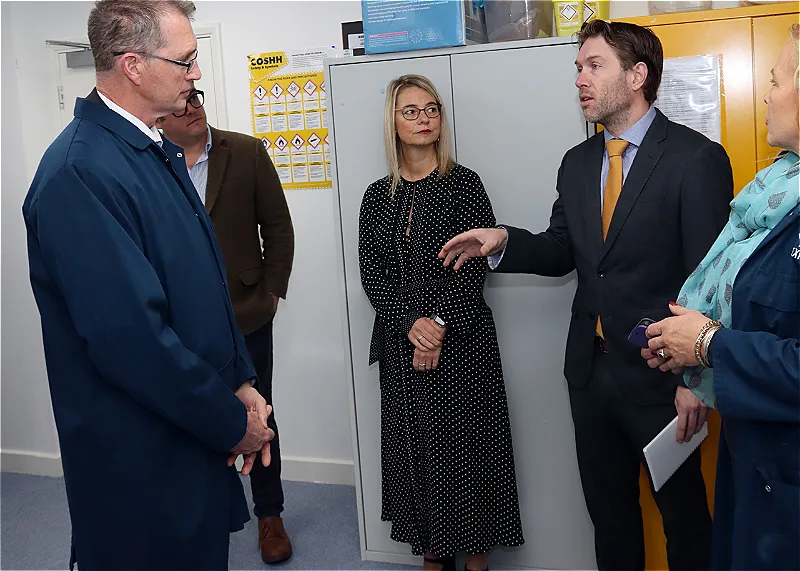Article
Funding announced for S W Wales ‘Launchpad’— driving growth in renewable technologies
This article is more than 13 months old
Images may not be available for articles over a year old
23 October 2023
‘Launchpad: net zero industry, South West Wales’ — a partner project which builds on the success of the region’s well-established South Wales Industrial Cluster (SWIC) — is set to benefit from up to £7.5m of new investment to drive the area’s innovation and business growth in renewable technologies.
Businesses and researchers from across Wales and the UK can benefit from the Launchpads programme — providing their project has a direct impact on the South West Wales region, made up of Neath Port Talbot, Swansea, Carmarthenshire, and Pembrokeshire.
Businesses can apply for competitive grants, with other support, for innovation projects that focus on technologies that support the region’s transition towards net zero — such as floating offshore wind investments, green or blue hydrogen production and distribution, CO2 capture and storage, and sustainable fuel solutions*.
Grant funding available starts from £25,000, with up to £1 million for projects that provide exceptional impact to the cluster. The competition opens on 30 October and closes on 13 December.
The Launchpad programme is funded by Innovate UK, part of UK Research and Innovation. It is designed to build on innovation clusters around the UK that have significant growth potential and to deliver jobs, growth, and higher productivity, supporting the UK Government’s levelling-up agenda.
The South West Wales Launchpad has been developed by Net Zero Industry Wales, Neath Port Talbot County Borough Council and Pembrokeshire County Council in partnership with Innovate UK.
The Launchpad projects will contribute to delivering growth in net zero, renewable energy and circular economy sectors, and high-value employment in South West Wales — which is the second largest carbon emitter in the UK.
Successful applicants will receive:
• expert, high-level support from public sector officials, academia and industry partners on developing business cases for coordinated investment of future public funding opportunities
• access to established governance structures, helping to drive innovation projects forward while adapting to new opportunities
• support to develop high quality business led projects in response to future UKRI opportunities, helping to unlock funding
• skills development to support the transformation of the workforce.
Welsh Secretary David TC Davies said: “It is fantastic that £7.5m of UK Government funding is coming to South West Wales to support the growing net zero industry in this part of the country. There are some really innovative businesses who are already collaborating with each other and researchers to develop industries of the future, and this Launchpad funding will deliver what they need to take their work to the next level.
“The UK Government is committed to creating jobs and growing prosperity in Wales, and this is exactly the type of intervention that will help to foster a modern 21st century economy in the Neath Port Talbot area.”
Ben Burggraaf, CEO of Net Zero Industry Wales, said: “Our role is to power the uptake of low carbon technologies — through fostering collaboration, forming strategic partnerships, and unlocking investment opportunities, like this one.
“Wales has huge potential to lead the way in renewable energy and production of sustainable goods and services and we hope that our partnership with Innovate UK’s Launchpads will provide the support, and help unlock the investment, that so many businesses need to adopt low carbon technologies.”
Cllr Steve Hunt, the Leader of Neath Port Talbot Council, said: “The Launchpad supports SWIC’s wider Regional Economic Delivery Plan, including delivering our mission of establishing South West Wales as a UK leader in renewable energy and the net zero economy.
“We’re excited to bring 15 years’ experience of collaborative working in South West Wales to share with SMEs to help them on their journeys to decarbonise, while benefiting our region in the process.”
Innovate UK CEO Indro Mukerjee said: “Innovate UK is building strong regional partnerships across the UK to support local innovation and commercialisation. Our new Launchpads will help to attract further private sector R&D investment into innovation clusters, growing local economies and delivering societal and economic benefits to local communities.”
Economy Minister, Vaughan Gething, added: “I am delighted that Net Zero Industry Wales, Neath Port Talbot County Borough Council and Pembrokeshire County Council have been successful in their application for funding from Innovate UK to establish a Launchpad.
“I supported the establishment of Net Zero Industry Wales as an independent body to help Welsh industry decarbonise, create new jobs in the green industries of the future and unlock investment opportunities and funding.
“This approach to collaborative working is exactly what we envisaged in our new Innovation Strategy, Wales Innovates, which includes achievable goals towards our vision of creating and nurturing a vibrant innovation culture as part of a stronger, fairer, greener Wales.”
To find out more about the Launchpad: net zero industry, South West Wales competition and to sign up to a briefing event in November, visit https://iuk.ktn-uk.org/programme/launchpads/.
*Projects can focus on one or more of the following:
• (Floating) offshore wind (FLOW) Celtic Sea
• Novel onshore renewable generation
• Green or blue hydrogen production and distribution
• CO2 capture, distribution and storage
• Sustainable fuel and platform chemical production
• Fuel switching
• Electrification
• (Waste) Heat distribution and utilisation
• Mini grid community systems
• Supporting innovation in skills development
This list is not exhaustive — but businesses must demonstrate how their proposal meets the competition criteria.
